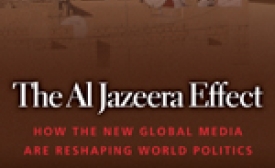social media

CPD Director Philip Seib interviewed by Radio France International Espanol about Al Jazeera's coverage of mideast uprisings.
Co-chaired by Ambassador James Glassman and Secretary Dan Glickman, the Strategic Public Diplomacy Project seeks to develop recommendations on ways to tightly integrate public diplomacy with foreign policy to advance U.S. strategic interests in a new media age.
Citizens in Egypt have been using Twitter, Facebook and other pathways of the Internet to communicate to the outside world, challenging the government of President Hosni Mubarak. Authorities have shut down Internet services, but protesters are finding ways to get information out and organize mass rallies. While Egypt's government has to shut down Internet services, the U.S. State department is using Twitter and other social media service for statecraft and diplomacy.

PDiN Monitor Editorial Staff
Sherine B. Walton, Editor-in-Chief
Naomi Leight, Managing Editor
Marissa Cruz-Enriquez, Associate Editor
During the street demonstrations in Tunis, amidst the signs demanding “Ben Ali Out” were placards saying “Thank you, Al Jazeera.” The Qatar-based pan-Arab television network has never been allowed to open a bureau in Tunisia – a prescient if ultimately unsuccessful tactic by Zine el-Abidine Ben Ali’s government...
During the street demonstrations in Tunis, amidst the signs demanding “Ben Ali Out” were placards saying “Thank you, Al Jazeera.”
The African country that has the highest percentage of people with Facebook accounts is Tunisia, at 18%. That's triple the penetration of the social-media service in repressive Egypt.







